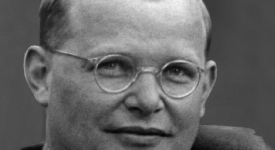Seriously, if you have not known or ever contemplated the problem of evil, you may have been born someone else—certainly not in this our world. In our own world, we recognize and feel pain, from the pain of natural disasters to localized tsunamis such as mammoth corrupt rulers who disguise and impose themselves on us in the name of all irreverent things. Question such, have your name in the book of death. Refusal to question their rule also leaves you in the abyss of hell, fired by unnatural sufferings and the knowledge that you are trapped.
Most people who took seriously the problem of God had at some point pondered about the audacity of human-to-human wickedness. It is from understanding that most of the evils which we encounter in society are definitely avoidable that the next dilemma, the problem God is birthed. Take for example, the priests who defile young children; or the politician or boss who seizes the salaries of their staff, placing them in some fixed deposit over a period of say six months, and afterwards releasing them, but not after they’ve yielded them interests; the husband who beats wife, gets another on the street; or the preacher who knows too well all words in the texts in his press-printed ONLY book, and orders the slaughter of school children, in the name of the most righteous, etc. The list goes on and on and on. Encountering evil is both spiritually and psychologically transforming epiphany. Experience is nailed head on. It is like meeting God face to face. And God tells you: “this is evil.”
________________________________________________
Still this is not the sort of problem of God we are interested in here—not today.
Ask John Milton or Abraham Lincoln, they’d tell you their experience of evil—and of God. Ask the leader of a terror sect such as the one Africa’s giant has produced, Boko Haram, they’d tell you they have the direct orders of God to take my head off. Don’t you imagine if this God in the sky is the same everywhere; if the God of Pope Liberius, the first pope, is the same as the funky God of Pope Francis (anyway like it or not, he is cute and his actions condemn most world leaders as political hypocrites).[1]
________________________________________________
This theological problem, arising from the palpability and reality of social and physical pains, or evil, majorly from the catastrophic actions of humans to fellow humans, continues to steer us in the face, unblinkingly. A problem which has attracted the attention of religious and irreligious characters alike, the God conundrum reeks all the more with embarrassing, if not overly intimidating, audacity in modern life.
Aptly described as “The problem of Evil”, philosophers have made serious attempt to reconstruct sense out of the seeming senseless horrors of human existence; theists, the clergy in particular (of course, it is they who have be-come ‘heirs apparent to the kingdom of the gods, with attendant feverish craze to grab earthly domains, are too quick to run into the pages of texted sanctuaries to prevent any further damage to their estates.
In many religious and secular, or in fact, circular, circles, the association of evil to the supreme being is considered unforgiveable heresy. The supreme being, variously guised in various garments of power, from religious to the political, is the enchantment of social being, the manifesto of community power. Before trouble-making activists (our sisters and brethren in the French revolution being perfect samples) have liberated us from the spells of the political strongholds of our dear social supreme lords, denying logic and life to power immutability, women and their testosteroned counterparts provided reverse framework for thinking about the political nature of social and theological problems. But in consequence, many heads barbecued in kings’ stakes.
________________________________________________
Before people like Alvin Platinga, and many others, David Hume’s (1711-1776) devastating punch was not the first: in a most Christ-like fashion (unlike most of the Christians you will never know), Hume acknowledged the role and place of St. Epicurus (who himself) had made some serious efforts with regards to the nagging issue, the problem, of evil; hence, making the latter the proper originator of this dark conversation.
Doubtless, throughout philosophical history Hume will be considered a towering eccentric. His influence is still here with us, even after his death in 1776. Perhaps, you will appreciate his work when you find that your philosophy or philosophy of religion professor is only concerned with their paycheck, not about “the least among these.”[2]
Necessarily, therefore, the problem of evil eventually leads to the problem of God. In his Dialogues Concerning Natural Religion, Hume rhetorically queries God:
Is he willing to prevent evil, but not able? Then is he impotent. Is he able, but not willing? Then is he malevolent. Is he both able and willing? Whence then is evil?[3]
________________________________________________
DEFRAGMENTING: RE-STATING A PROBLEM
This is the problem of God: Christians tell Muslims that their Allah cannot save; Muslims, in demonstrating that not only does Allah save, but that he also maims, go rampage, kill a few hundreds. Religious dialogue convocation is held. The matter is suspended. Every one returns to their houses to count their losses. Next time there is a call to condemn gays and homosexuals, our religious hegemons come out in unity decrying the morality state of our society. Six gays are beheaded; 32 witched are smoked in gas flames. We are happy. Enemy vanquished. Four months later, our holy men are engulfed in tussle for their divine positions; rival groups assassinate rivals. God ordered the killings. (It is written.) Nothing spoiled. We remain patriotic and committed to our fundamentalism.
But those who still are able to self-examine their brains will know that some awkward stuff is going on. Maybe persons who have had a supernatural encounter with epicurean spirits can tell that we have been bewitched by a black versed Wizard of Af.








